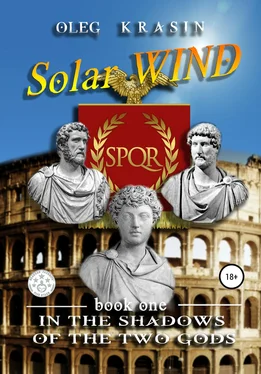Oleg Krasin - Solar Wind. Book one
Здесь есть возможность читать онлайн «Oleg Krasin - Solar Wind. Book one» — ознакомительный отрывок электронной книги совершенно бесплатно, а после прочтения отрывка купить полную версию. В некоторых случаях можно слушать аудио, скачать через торрент в формате fb2 и присутствует краткое содержание. Год выпуска: 2022, Жанр: Биографии и Мемуары, Историческая проза, на русском языке. Описание произведения, (предисловие) а так же отзывы посетителей доступны на портале библиотеки ЛибКат.
- Название:Solar Wind. Book one
- Автор:
- Жанр:
- Год:2022
- ISBN:нет данных
- Рейтинг книги:3 / 5. Голосов: 1
-
Избранное:Добавить в избранное
- Отзывы:
-
Ваша оценка:
- 60
- 1
- 2
- 3
- 4
- 5
Solar Wind. Book one: краткое содержание, описание и аннотация
Предлагаем к чтению аннотацию, описание, краткое содержание или предисловие (зависит от того, что написал сам автор книги «Solar Wind. Book one»). Если вы не нашли необходимую информацию о книге — напишите в комментариях, мы постараемся отыскать её.
MARCUS AURELIUS ANTONINUS
The emperor-philosopher, for a moment, thanks to him, the world was governed by the best and greatest man of his age.
Solar Wind. Book one — читать онлайн ознакомительный отрывок
Ниже представлен текст книги, разбитый по страницам. Система сохранения места последней прочитанной страницы, позволяет с удобством читать онлайн бесплатно книгу «Solar Wind. Book one», без необходимости каждый раз заново искать на чём Вы остановились. Поставьте закладку, и сможете в любой момент перейти на страницу, на которой закончили чтение.
Интервал:
Закладка:
But Antinous appeared after the emperor's meeting with Marcus. First, there was Marcus.
The boy was six years old when, in between his far and long journeys, Hadrian saw him. A small, thin, big eyed boy, dressed in a white tunic.
Nearby stood his mother, Domitia Lucilla—a venerable Roman matron, who lost her husband early and did not remarry. She owned a large brick factory on the outskirts of Rome. His great-grandfather, Catilius Severus Regin, a well-known senator who held an important position as prefect of Rome, was also there.
They wanted the emperor to distinguish him, because Marcus was, after all, a distant relative of Caesar through Sabine. Hadrian was then in a good mood without the whims and irritations that had become commonplace in recent times, without a shadow of melancholic sadness at the sight of someone else's youth, which seemed irretrievably lost by himself. And he didn't resist. Distinguish little Verus? Why not!
Hadrian gave him a white rider toga 10 10 Toga is the outerwear worn by men in ancient Rome
with a narrow red stripe and a ring that the boy could not yet wear on his finger because of its large size. This did not seem surprising because there were other boys of tender age, who were already distinguished by emperors. Another mercy aroused surprise—Hadrian the next year introduced Marcus to the priestly college of the Salii, 11 11 Salire (Latin) – jumping, dancing.
these jumpers, keeping the morale in the people. There were twelve of them, and they worshipped Mars, a god who, for the Romans who were used to fighting, was not the last in the divine pantheon.
Probably, the tedious rites associated with walking the streets, dancing, shouting, the noise of the city crowd, did not fit at all for a seven-year-old boy. And yet the boy was given a great honor, about which he did not suspect and did not fully understand its meaning, but his loved ones knew and understood—venerable mother and stern great-grandfather.
Then, another close emperor, his secretary, Gaius Avidius Heliodorus, a Syrian-born man from the city of Kirra, a swarthy man with almond-shaped brown eyes, sympathetically told Hadrian how he watched a strange procession on one of the streets of the city: eleven adult men and a boy walking nearby.
“He was serious, this little Marcus,” Heliodorus said, bowing respectfully before Caesar. “He was walking with a tense frown, as he held a shield in his left hand, and in his right a little twig. Of course, the shield was smaller, not like that of grown men—it was made special—but he faithfully beat it with a wooden stick, and also sang along with all the old battle songs “Help, Lara, us!” and “Be enough, evil Mars!”
“Well, you heard them,” he added.
Tricky Heliodorus did not explain that the meaning of these songs no one remembered, and because of the outsider's eye they seemed a set of incoherent sounds. But Marcus, as the attentive secretary noted, had a good memory, and he confidently sang along with his ringing boyish voice, focused on jumping in the streets to the cheerful and loud cries of the priests.
An integral part of the ritual was the evening meal, accompanied by libations, with loud cries of diverging priests. It was said that Emperor Claudius had somehow specially dressed as a Salii to participate in such drinking in the temple of Mars on Palatine Hill.
The Salii feasted widely, on a grand scale. It used to be the case, and so it was under Marcus. The boy did not seem surprised, as if he had gotten used to the ugly antics of drunken priests from the cradle.
One of the priests, a certain Victor Galerius Fabian, fell under the table, and could hardly be hoisted into place by his fellow feasters. Hadrian knew about this case from the frumentarii 12 12 Frumentarii (Latin) were individuals who ran public bread shops and collected different information for the emperor.
who reported all the incidents in the empire. He asked, smiling affectionately in a beard that had not yet grayed:
“What did you see, little Verus?”
And Marcus unsophisticated told the emperor about these feasts. Hadrian looked intently into the boy's lively eyes, which did not lie, he saw it, and he liked the honesty of little Annius. That's probably why he nicknamed him “Verissimus.” 13 13 Verissimus (Latin) is the truest, true.
However, this acquaintance with the promising little rider was interrupted for a long time—the emperor was delayed by other countries, distant cities, strangers, and new impressions.
Hadrian, of course, heard a variety of rumors, gossip from Rome, including about Marcus Verus. All the same Heliodorus told how the young Marcus, along with other priests, threw wreaths on a pillow with the image of Mars, and if the priests' wreaths fell somewhere, then Marcus definitely fell on the head of the war god.
“Perhaps our priests' hands were shaking after the wine was drunk,” the emperor observed sarcastically.
But this event once again confirmed Hadrian's conviction in the benefits of horoscopes—because the horoscope left no doubt about the purpose of Marcus, he was expected to be granted honorable and important appointments, and, of course, the highest office in Rome.
“So, the gods favor our Marcus, our Verissimus?” Hadrian asked, stroking the silky skin of the greyhound he had taken with him to hunt. They were in Greece, near Athens. From the imperial palace the rocky bare mountains could be seen, the tops of which clung to lonely clouds.
“Yes, Emperor!” Heliodorus nodded his head. “Everyone took what had happened as a sign sent by the gods.”
“Perhaps, perhaps!” Hadrian muttered thoughtfully, and then quoted with pathos, “The throne and the power over the country are set by this fortune-teller.” 14 14 Annius "Annales,” book 1., (translated by S.A. Osherov), Chrystomatia on early Roman literature, Moscow, 2nd edition, publishing house "Greek-Latin Cabinet of J.A. Shichalina," 2000, p.35
He cast a fleeting glance at the secretary.
Heliodorus drew his attention to his face, smiled encouragingly, and knowing Hadrian's vanity, decided to play along.
“Caesar, these lines from Virgil?
“No, Heliodorus. How can you not study Annius, his Annales? Every citizen of Rome should know the poem by heart. It is about the iron character of the Romans and their indestructible greatness. Today, call reader Philip! In the evening I intend to listen to an excerpt about the dispute with King Pyrrhus, in which the speech of Appius Claudius the Blind is heard. It is there in those verses,” he said. “You can join in.”
“I'll take it for honor, Caesar!”
“Let you know that I put Ennius above Virgil, who also has talent, but is undisputed, for Virgil took a lot from Annius, his style, his expressions, his words. And Ennius plays “The Abduction of the Sabines”? That's what happens when a man is guided by a great genius.” 15 15 Genius is the spirit of the patron saint of men.
The emperor spoke with enthusiasm. The red toga slid off his shoulder, and the edge of the white tunic appeared, on which the attentive secretary saw a drop of dried blood. Only yesterday there was a lot of bleeding coming from Hadrian's nose, which could hardly be stopped, but today he felt noticeably better. The bleeding frightened him, and over time only intensified.
Returning in the spring in Tibur, Hadrian seriously thought about a successor. It was necessary to rush with this because the bleeding did not stop.
And yet… the horoscope said one thing, but Hadrian's will could do another thing, he was very conceited, proud, and if the horoscope said “yes,” he could say no, not caring about the planetary prophecies, the opinions of the priests or those of the boy's relatives.
Читать дальшеИнтервал:
Закладка:
Похожие книги на «Solar Wind. Book one»
Представляем Вашему вниманию похожие книги на «Solar Wind. Book one» списком для выбора. Мы отобрали схожую по названию и смыслу литературу в надежде предоставить читателям больше вариантов отыскать новые, интересные, ещё непрочитанные произведения.
Обсуждение, отзывы о книге «Solar Wind. Book one» и просто собственные мнения читателей. Оставьте ваши комментарии, напишите, что Вы думаете о произведении, его смысле или главных героях. Укажите что конкретно понравилось, а что нет, и почему Вы так считаете.










